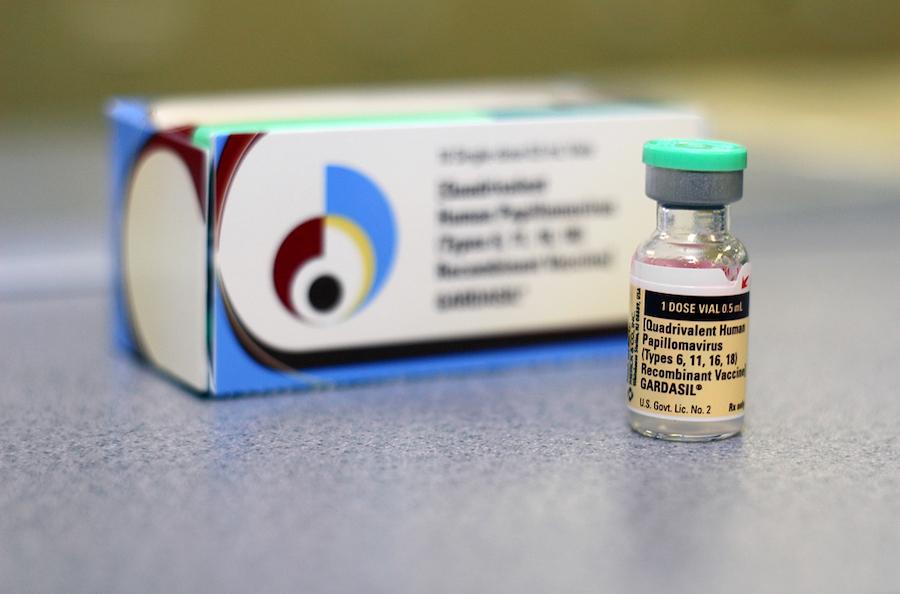United Kingdom: cervical cancers have dropped by 87% thanks to vaccination<
According to the results of a British study, the major impact of papillomavirus vaccination finally seems to be able to be demonstrated.The frequency of cervical cancers would have dropped 87% in women in the United Kingdom, thanks to the vaccine.The country has vaccination coverage of more than 80%, while it struggles to exceed 28% among young French women.
The study, published Wednesday, November 3 by the scientific journal The Lancet, brings positive news about the fight against cancer in women.According to its conclusions, the number of cases of cervical cancers would have particularly decreased in British women vaccinated against the human papillomavirus virus or HPV.The latter, which is transmitted by sexual means, settles in the neck and can cause precancerous lesions, which can potentially evolve towards cancer ten years after infection.
These vaccines, available since the early 2000s and on which there was still a decline in their effectiveness, seem to demonstrate their major impact for the first time.The authors of the study conducted by Lancet have delighted these results: “Our study gives the first direct evidence of the effect of vaccination against human papillomavirus [HPV], by the Cervarix vaccine on the frequency of collar canceruterus.According to researchers, this vaccine is responsible for a clear reduction in cases, especially in young girls vaccinated from the age of 12-13 years.
To date, there are two types of vaccine targeting HPV.The first, Cervarix, which appeared in 2007, acts against two types of human papillomavirus, the 16 and 18 responsible for 70 % to 80 % of collar cancers.The second, known as Gardasil, is effective against four forms of the virus, and a new version soon to be marketed will be likely to target 9.
A vaccination campaign carried out by the WHO that has borne fruit in the United Kingdom but not in France

Last year, the World Health Organization (WHO) aims to eliminate cervical cancer, after having collected data showing that the problem was not taken enough seriouslyby world health authorities.In 2018, she estimated that the disease killed 312,000 women per year, including more than 1,000 in France.Human papillomavirus vaccination was then at the heart of the eradication strategy launched by the world organization.
Following these directives, many countries have launched massive vaccination campaigns to protect their population.This is the case of the United Kingdom where vaccination coverage now exceeds 80 % among adolescent girls, but also in Scandinavian countries.France, it seems to have missed the mark, since its vaccination coverage is struggling to reach 28% among young girls of 16 year old.Questioned by Le Monde, Roland Viraben, dermatologist and venerologist, was sorry for these statistics giving France "one of the weakest covers in Europe.»»
From this morning i have concluded that i donno How to use a waffle maker
— XOKARLITA Tue May 12 14:09:26 +0000 2020
Jean-Baptiste Méric, Director of the Public Health and Care Pole at the National Cancer Institute (Inca) also praised the example that this study was to constitute in the columns of the world.: "This is an important study because it confirms, with a solid methodology, the trends already observed in Sweden, Finland and the United States in young girls vaccinated before the first intercourse.»» Selon lui, avec un couverture vaccinale de 85%, on « éviterait chaque année 2 500 interventions chirurgicales sur le col de l’utérus, 377 cancers du col et 139 décès»» dans les hôpitaux français.
The sooner the vaccine is administered, the more its effectiveness increases
The study launched by The Lancet is spread over more than 10 years.To make it, its authors have looked into the data collected by the United Kingdom Cancer registers between January 2006 and June 2019, and worked on seven groups of women, aged 20 to 64 at the end of thestudy.
In the end, 28,000 collar cancers were diagnosed in the United Kingdom during these 13 years.In vaccinated women's groups, there are 450 collar cancers less than in non -vaccinated cohorts.The survey reports that overall: “Collar cancer rates fell 87 % in women vaccinated between 12 and 13 years old, 62 % in those vaccinated between 14 and 16 years old.»» Chez les adolescentes vaccinées entre 16 et 18 ans, le taux diminue de 34 %, ce qui montre que la vaccination est plus efficace s’il elle est administrée au plus tôt.
Vaccination, although effective, is not the only lever to activate against the papillomavirus
In his interview with the world, Jean-Baptiste Méric explains that the results of the survey are as positive as it is outstanded. Il a confié que les experts s’attendaient à ce que « les effets sur les cancers du col»» soient observables seulement après « une dizaine d'années, compte tenu du délai entre l’infection et leur apparition.»»
Vaccination must be accompanied by other levers if the health authorities want to end the papillomavirus.Doctors recommend greater education in the face of the risk of collar cancer in adolescent girls, but also frequent screening for young girls.The latter make it possible to detect the precancerous lesions caused by the virus and to treat them before they turn into cancer.According to Jean-Baptiste Méric, "less than 60% of the women concerned would be tested.»»
In France, vaccination against papillomavirus is not compulsory, but it can be offered to girls and boys aged 11 to 14 years old, with a possible catch -up of their 15 to their 19th birthday.Homosexual men are also eligible until the age of 26.


 Tags:
Tags: Prev
Prev







